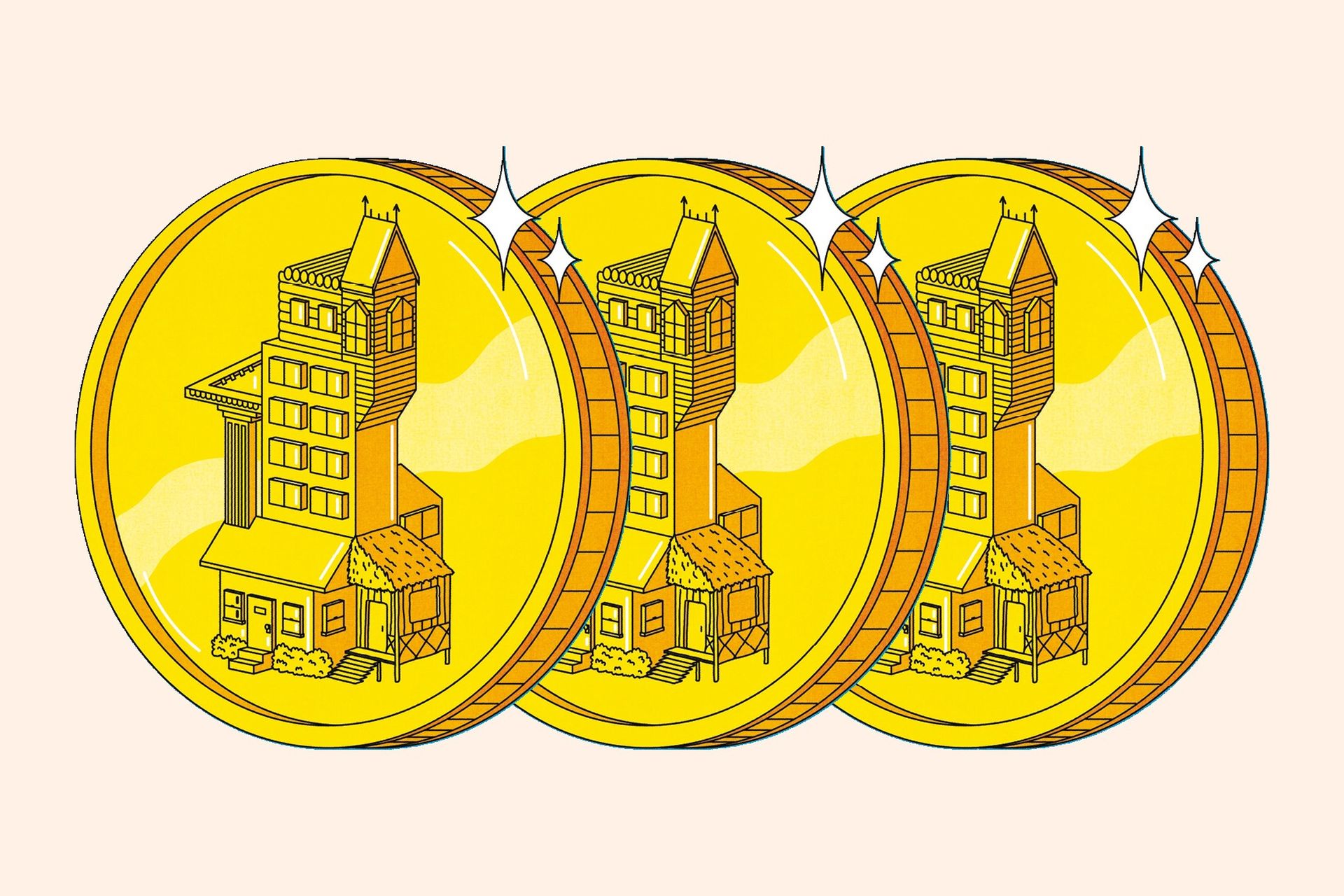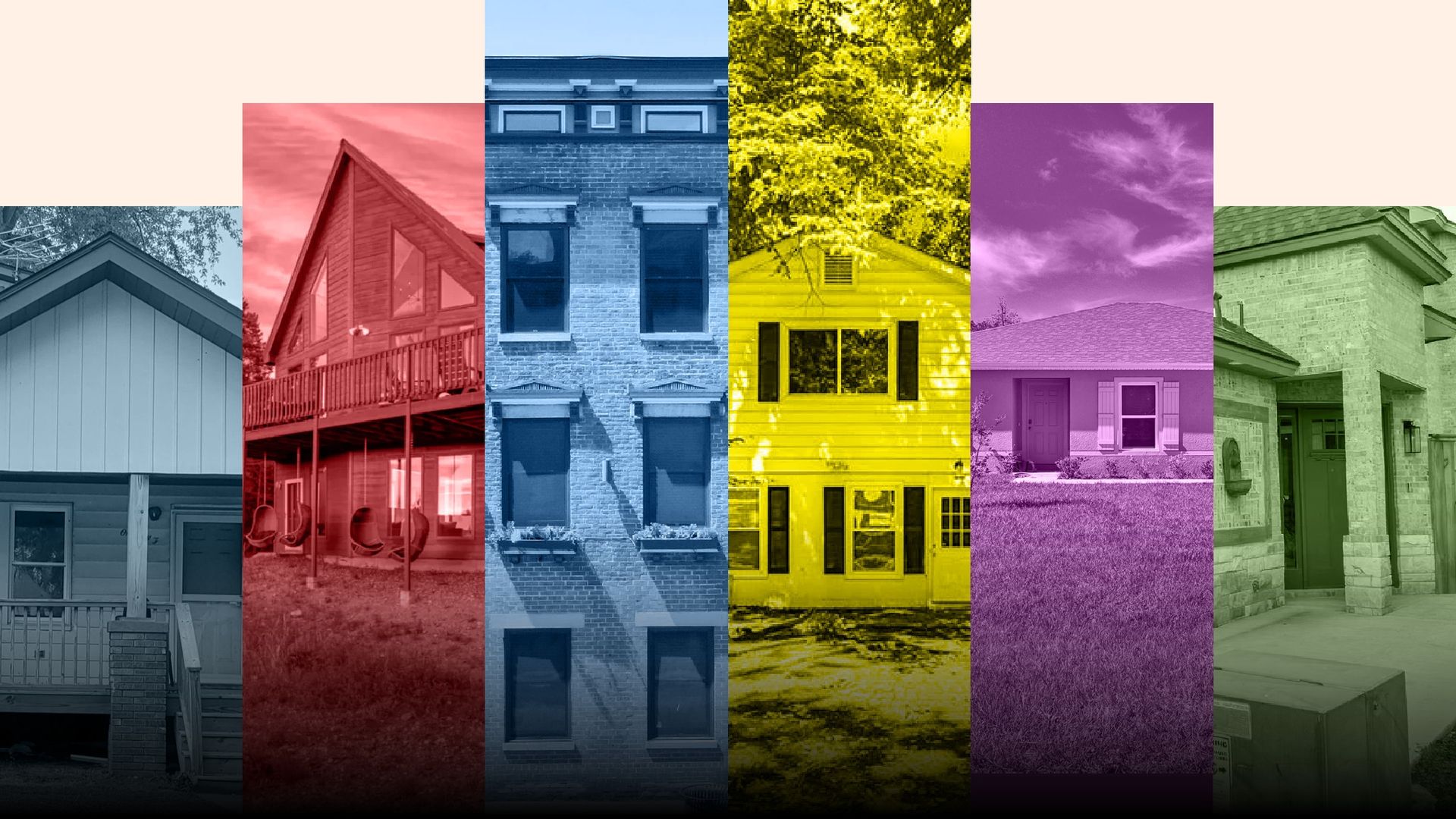尊敬的用户您好,这是来自FT中文网的温馨提示:如您对更多FT中文网的内容感兴趣,请在苹果应用商店或谷歌应用市场搜索“FT中文网”,下载FT中文网的官方应用。

Retired banker Rick Phillips likes investing in property. But instead of putting down a deposit for a place he has seen, or investing money into funds listed on the stock market, the cryptocurrency enthusiast chooses to buy digital tokens that represent ownership of physical properties.
退休银行家里克•菲利普斯(Rick Phillips)喜欢投资房地产。但这位加密货币爱好者选择购买代表实物房产所有权的数字代币,而不是为他看中的房产支付定金,也不是将资金投资于股市上市的基金。
The Los Angeleno is one of a small number of investors testing the waters in property tokenisation, a nascent way to invest in rental real estate that gives would-be buyers the ability to hold a digital sliver of a bricks-and-mortar building. So far, Phillips has invested $20,000 across several properties.
这位洛杉矶人是少数几位试水房地产代币化的投资者之一,这是一种新兴的投资方式,让潜在买家能够持有一小部分实体建筑的数字化份额。到目前为止,菲利普斯已经在几个物业上投资了2万美元。
Property tokenisation companies such as Lofty, RealT and HouseBit offer a range of buildings to invest in, using either cryptocurrency or standard bank deposits.
房地产代币化公司,如Lofty、RealT和HouseBit,提供了一系列可以使用加密货币或标准银行存款进行投资的建筑物。
Born from crypto and blockchain’s promise to democratise finance and broaden financial access, the niche investment method is slowly gaining popularity among crypto fans seeking new areas in which to invest their funds and use blockchain technology — and as high house prices in large cities like London and New York make investing in property outright increasingly unaffordable for many.
这种小众投资方法源于加密货币和区块链对金融民主化和扩大金融准入的承诺,正在逐渐受到加密货币爱好者的欢迎,他们在寻找新的投资领域和使用区块链技术的机会。而伦敦和纽约等大城市的高房价使得许多人越来越难以负担直接投资房地产。
“It’s a different way to invest because it has a lower threshold to getting into buying real property,” says Phillips, who owns “slices” of 12 tenanted properties, mainly in Ohio and Memphis.
“这是一种不同的投资方式,因为购买房地产的门槛较低,”菲利普斯说道,他拥有12处租赁物业的“份额”,主要位于俄亥俄州和孟菲斯。
The enterprise sounds promising, offering a way to own a slice of a property and benefit from its potential to rise in value and its incoming rents. But there are a host of issues. Not least, investors complain, difficulties selling tokens and problems arising from tenant issues.
这家企业听起来很有前景,提供了一种拥有部分房产并从其升值潜力和租金收入中受益的方式。但也存在许多问题。投资者抱怨最多的是出售代币的困难以及由租户问题引发的麻烦。

Tokenised real estate promises a tangible way to invest small amounts in individual properties, rather than in real estate investment trusts (REITs), which typically own or finance large groups of commercial and residential buildings. “Real estate is a very emotional asset class,” says Jerry Chu, founder of Lofty. “REITs exist and funds exist [but] people seem to be a lot happier about ownership when they can say, ‘It’s this address, I own it because of these reasons.’”
代币化房地产为投资者提供了一种以小额资金投资个别房产的有形方式,而不是投资于通常拥有或资助大量商业和住宅建筑的房地产投资信托基金(REITs)。Lofty的创始人Jerry Chu表示:“房地产是一种非常感性的资产类别。REITs和基金都存在,但当人们能够说‘这是这个地址,我拥有它,因为这些原因’时,他们似乎对所有权更加满意。”
An asset such as a house or hotel is sliced into digital tokens that represent ownership. Each token can hold information such as the asset’s ownership history, trading and regulatory details, and the tokens live on a blockchain, which essentially acts as a digital record keeper.
像房屋或酒店这样的资产被分割成代表所有权的数字代币。每个代币可以包含资产的所有权历史、交易和监管细节,这些代币在区块链上,区块链本质上充当数字记录器。
Tokenisation is taking off on Wall Street — BlackRock, Franklin Templeton and Fidelity International are among the asset managers exploring tokenising funds in order to make it cheaper and easier to move assets, but these are largely only available to institutional investors, not individuals, and none involve cryptocurrencies; asset managers are still wary.
代币化正在华尔街兴起——贝莱德(BlackRock)、富兰克林邓普顿(Franklin Templeton)和富达国际(Fidelity International)等资产管理公司正在探索代币化基金,以便更便宜、更容易地转移资产,但这些基金主要只面向机构投资者,而不面向个人,也不涉及加密货币;资产管理公司仍持谨慎态度。
$50The typical value of each token representing a fraction of house ownership on Lofty
$50每个代表Lofty房屋所有权一部分的代币的典型价值
“It’s really the question of convenience because the asset becomes liquid, it becomes tradable 24/7, and a global pool of investors have access to it,” says Max Dilendorf, a New York-based digital assets lawyer, adding that the retail market for tokenised products is “slowly developing”.
“这实际上是一个便利性问题,因为资产变得流动起来,变得可以全天候交易,并且全球范围内的投资者都可以访问它,”纽约数字资产律师马克斯•迪伦道夫(Max Dilendorf)表示,他补充说,代币化产品的零售市场正在“缓慢发展”。
Tokenising illiquid assets globally could create a market worth between $2tn and $16tn by 2030, according to estimates from McKinsey and Boston Consulting Group. Tokenised home equity alone could be worth $3.2tn, BCG estimates, and enable “borderless” access, by allowing investors from around the world to hold slices of illiquid assets that are otherwise difficult to own.
根据麦肯锡(McKinsey)和波士顿咨询公司(Boston Consulting Group)的估计,到2030年,全球非流动性资产代币化可能创造一个价值介于2万亿美元和16万亿美元之间的市场。波士顿咨询公司估计,仅代币化的房屋净值就可能价值3.2万亿美元,并通过允许来自世界各地的投资者持有难以拥有的非流动性资产的部分份额,实现“无国界”访问。
“The folks that tend to be interested in tokenised products are individuals that are crypto-forward or interested in the applications of blockchain technology,” says Melissa Bender, a partner at law firm Ropes and Gray. “They’re potentially getting exposure to asset classes that are less accessible to them.”
Ropes and Gray律师事务所的合伙人梅丽莎•本德(Melissa Bender)表示:“对代币化产品感兴趣的人通常是那些对加密货币前沿或区块链技术应用感兴趣的个人。他们有可能接触到对他们来说不太容易接触到的资产类别。”
Mathew, a 42-year-old from Toronto has invested $1,250 in six homes through Lofty, including family homes in Ohio, Chicago and Florida. “I am involved in some other crypto projects . . . [but] cryptocurrency is very volatile so I put my assets into something a little bit more stable,” he says. “I’ve always wanted to own my own place but in the conditions now I can’t do it — getting a downpayment is difficult.” He has made a roughly 10 per cent return over two years.
来自多伦多的42岁的马修通过Lofty投资了1250美元购买了六套房屋,其中包括俄亥俄州、芝加哥和佛罗里达的家庭住宅。他说:“我还参与了其他一些加密货币项目……但是加密货币非常波动,所以我把我的资产投入到更稳定的东西上。我一直想拥有自己的房子,但在目前的条件下我做不到——首付款很难筹集。”他在两年内获得了大约10%的回报。

Founded in 2018 in Miami, Lofty is backed by Y Combinator, the Silicon Valley start-up incubator that spawned companies including Airbnb and the crypto exchange Coinbase. Property sellers list their buildings on the website and Lofty creates a company registered in Wyoming for each one, making tokens representing the ownership, each valued at $50. The site has tokenised more than 181 properties to date.
Lofty成立于2018年,总部位于迈阿密,得到了硅谷初创孵化器Y Combinator的支持,该孵化器孵化了包括爱彼迎和加密货币交易所Coinbase在内的公司。房地产卖家在该网站上列出他们的建筑物,Lofty为每个建筑物创建了一家在怀俄明注册的公司,并发行代表所有权的代币,每个代币价值50美元。到目前为止,该网站已经代币化了超过181处房地产。
Jordan Bentley, who founded an advertising company, owns three rental properties as well as his own home in Utah, properties which he says are worth about $2mn. This summer, he sold 10 per cent of one investment property on Lofty, raising $30,000 to fund buying a new family home. He says selling a slice of the home was cheaper than taking out a loan against a property at high interest rates, and a better decision than selling a property outright to raise cash.
乔丹•本特利(Jordan Bentley)创办了一家广告公司,在犹他拥有三处出租物业和自己的住宅,他表示这些物业价值约为200万美元。今年夏天,他在Lofty上出售了一处投资物业的10%股份,筹集了3万美元用于购买新的家庭住宅。他表示,出售部分房产比以高利率抵押贷款更便宜,也比直接出售房产筹集资金更明智。
“The main downside of real estate historically has been the complete lack of liquidity,” says Bentley. It took “a couple of days” to sell the tokens, and the money was paid to him in the form of USDC, the world’s second biggest stablecoin, a form of digital cash that tracks the price of a reserve sovereign currency (in this case, the US dollar). He then transferred it to his own bank account as dollars.
“房地产的主要缺点一直以来都是完全缺乏流动性,”本特利说道。出售代币花了“几天”的时间,款项以USDC的形式支付给了他,USDC是世界上第二大稳定币,是一种跟踪储备主权货币(在这种情况下是美元)价格的数字现金。然后,他将其转入自己的银行账户作为美元。
After investors buy in, each token holder has voting rights in proportion to the number of coins they own, so they can contribute to making decisions about running the property, which are carried out by local property managers, hired by Lofty. “We want to be the Nasdaq of real estate,” says Chu, whose company charges a 3 per cent fee on buy and sell orders for tokens. “Real estate transactions have traditionally been very paperwork heavy . . . we want to update it so it’s a 21st-century process,” he adds.
在投资者买入后,每个代币持有者都有与其拥有的代币数量成比例的投票权,因此他们可以参与物业运营的决策,这些决策由Lofty聘请的当地物业经理执行。朱说:“我们希望成为房地产界的纳斯达克(Nasdaq)。”他的公司对代币的买卖订单收取3%的费用。他补充道:“传统的房地产交易文书工作非常繁重……我们希望将其更新为21世纪的流程。”

Many of Lofty’s first homes were in poorer neighbourhoods and low income housing; investors reported issues with rent arrears, evictions and maintenance problems. The company has recently changed tactics and is encouraging homeowners and Airbnb hosts to list portions of their properties. Rents from the Airbnb visitors are more consistently paid out to investors.
Lofty的许多首次住所位于较贫困的社区和低收入住房;投资者报告称存在租金拖欠、驱逐和维护问题。该公司最近改变了策略,鼓励房主和爱彼迎的房东将他们的房产部分列出。来自爱彼迎访客的租金更加稳定地支付给投资者。
Available properties include a seven-acre ranch house with space for 40 horses in California; an eight-bedroom wood-beamed cabin in Vermont, rented through Airbnb to skiers; a rustic cabin nestled in the Colorado mountains on an acre of land; and a three-family brick townhouse rented to tenants in upstate New York.
可供选择的房产包括位于加利福尼亚的一座占地七英亩、可容纳40匹马的牧场别墅;位于佛蒙特州的一座八居室木梁小屋,通过爱彼迎出租给滑雪者;位于科罗拉多山区的一座乡村小屋,占地一英亩;以及位于纽约州北部的一座三户砖砌联排别墅,出租给租户。
Phillips, an early investor with Lofty, says he stopped investing in houses in Chicago after rents on his properties there dwindled. “They would have tenant problems and maintenance problems so the cash flows weren’t steady on them.” He adds: “In Chicago, the laws are so renter favourable that when you have a tenant that stops paying rent, it’s very hard to evict them.”
Lofty的早期投资者菲利普斯表示,在芝加哥的房产租金减少后,他停止了在那里的投资。他说:“他们会遇到租户问题和维护问题,所以现金流不稳定。”他补充道:“在芝加哥,法律对租户非常有利,当租户停止支付租金时,很难将他们驱逐出去。”
Jean-Marc Jacobson, who co-founded RealT in 2019, says that his company is working on creating rental insurance that would pay out to investors if tenants stop handing over rent.
Jean-Marc Jacobson于2019年共同创立了RealT,他表示他的公司正在努力开发一种租赁保险,如果租户停止支付租金,该保险将向投资者支付赔偿金。
Buildings in need of maintenance can also see investors lose out. Each house has a so-called operating reserve on Lofty, essentially a fund worth about 5 per cent of the property’s total value, which is used by the local property managers to spend on maintenance. If the fund loses more than half of its value, investors typically replenish it using their rental income. Rent — when it is collected — is paid into investors’ Lofty wallets in the form of USDC, which they can withdraw to their bank account or crypto wallet.
需要维护的建筑物也可能导致投资者损失。每栋房屋在Lofty上都有一个所谓的运营储备金,基本上是房产总价值的约5%,由当地物业经理用于维护支出。如果该基金损失超过一半的价值,投资者通常会使用他们的租金收入来补充。租金(在收取时)以USDC的形式支付到投资者的Lofty钱包中,他们可以将其提取到他们的银行账户或加密钱包中。
Ownership and trades are recorded on the blockchain, which the companies say makes it easier for bringing in investors from around the world. “On a $100,000 property we have about 600 token holders from about 80 different countries,” says RealT’s Jacobson.
所有权和交易都记录在区块链上,这些公司表示,这使得吸引来自世界各地的投资者更加容易。RealT的Jean-Marc Jacobson表示:“在一处价值10万美元的房产上,我们有来自大约80个不同国家的大约600名代币持有者。”
One significant problem in the nascent market is the lack of secondary buyers. This raises the risk of getting stuck with an investment, or selling at a loss. “I haven’t sold the tokens,” says Jon Steven, who has invested about $28,000 in eight properties. “The secondary market is so thin that it’s hard to get a good price . . . You’ll see a trade for tokens at $30 and then Lofty will still say the tokens are worth $45.”
新兴市场中存在一个重要问题,即缺乏二级买家。这增加了投资被困或亏损出售的风险。乔恩•史蒂文(Jon Steven)说:“我还没有出售这些代币。”他在八个房产上投资了约28000美元。“二级市场非常薄弱,很难获得一个好价格……你会看到代币以30美元的价格交易,然后Lofty仍然会说这些代币价值45美元。”
“Liquidity is always a concern,” says Bender. “Until there are more participants, you are [still] going to be facing the challenges of holding an illiquid asset.”
“流动性始终是一个问题,”本德说。“在有更多参与者之前,你仍然会面临持有非流动性资产的挑战。”

Steven, a 40-year old software engineer, owns and rents out two houses himself in California and Oregon, has about $150,000 worth of crypto investments, $200,000 worth of equities, and “dabbles” in peer-to-peer investing with about $10,000. Investing in tokenised properties allowed him to expand his real estate interests. “I own other properties outright but it’s hard to come up with a lot of money sometimes . . . If I ever find myself with some extra money, rent payments from Lofty, I can reinvest it,” he adds. He has made a return just shy of 6 per cent. (The S&P 500 is up 24 per cent so far this year.)
史蒂文,一位40岁的软件工程师,在加利福尼亚和俄勒冈拥有并出租两栋房屋,拥有约15万美元的加密货币投资,价值20万美元的股票,并且在点对点投资中“涉猎”了约1万美元。投资代币化的房产使他能够扩大自己的房地产兴趣。“我拥有其他房产,但有时候筹集大量资金很困难……如果我有多余的钱,比如来自Lofty的租金,我可以重新投资,”他补充道。他的回报率接近6%。
Reinvestment is often easier than selling individual tokens.
再投资通常比出售单个代币更容易。
While all tokens on Lofty are created at a value of $50, not all coins, or houses, are equal. Phillips says the ease of selling tokens on Lofty depends on the individual property — and how other investors on the platform assess its potential by reading the financials provided, which can include rental history and Airbnb income, as well as understanding the location and maintenance level of the house.
虽然Lofty平台上的所有代币都以50美元的价值创建,但并非所有的代币或房屋都是相等的。菲利普斯表示,在Lofty上出售代币的难易程度取决于个别房产,以及平台上其他投资者通过阅读提供的财务信息来评估其潜力,这些信息可以包括租赁历史和爱彼迎收入,以及了解房屋的位置和维护水平。
$3.2tnEstimated potential market size of tokenised home equity by 2030
32亿美元预计到2030年,代币化房屋净值的潜在市场规模
“Anyone can come and list a property,” says Chu, adding that the company filters out bad actors. “We run background checks on the sellers, we filtered out people with mortgage fraud in the past.”
“任何人都可以来挂牌,”朱说道,并补充说公司会过滤掉不良分子。“我们对卖家进行背景调查,过滤掉过去有抵押贷款欺诈行为的人。”
Inevitably, being able to invest in properties with crypto raises significant issues such as money laundering and the reliability of customer checks that the tokenisation companies must address — US regulators continue to clamp down on crypto companies and traders acting illegally.
不可避免地,能够用加密货币投资房地产引发了诸如洗钱和客户检查可靠性等重大问题,这是代币化公司必须解决的问题——美国监管机构继续打击非法行为的加密货币公司和交易者。
RealT co-founder Jacobson says the average investor holds less than $100,000 on his platform. “If you go over $100,000 then there are further questions, [and requests for] more information about where the money comes from,” he adds.
RealT的联合创始人Jean-Marc Jacobson表示,平台上的普通投资者持有的资金少于10万美元。他补充道:“如果超过10万美元,就会有进一步的问题,并需要提供更多关于资金来源的信息。”
“We are seeing more and more demand from foreigners who want to buy bricks and mortar in the US,” says Benoit Laliberté, chief executive of HouseBit, adding that there is plenty of demand from “people who want to move quickly in the US [market]” and do not want to “go through the problem of banks”, underscoring crypto’s attraction as a tool for money laundering. The anonymity of crypto payments makes them highly attractive for moving money across the world without being detected.
“我们看到越来越多的外国人想要在美国购买房地产,” HouseBit首席执行官Benoit Laliberté表示,并补充说有很多“想要在美国市场快速行动”的需求,他们不想“经历银行的问题”,这突显了加密货币作为洗钱工具的吸引力。加密支付的匿名性使其在全球范围内转移资金而不被察觉非常有吸引力。

Investing in property in this way has a lot of downsides. But positive inspiration for the housing market might come from the hospitality industry, where hoteliers are also eyeing the prospect of selling portions of their buildings as tokens to investors.
以这种方式投资房地产有很多弊端。但房地产市场的积极灵感可能来自酒店业,酒店经营者也在考虑将其建筑物的一部分作为代币出售给投资者。
In Colorado, the St Regis Aspen Resort sits at the foothills of the mountains and draws thousands of skiers every year. Stephane De Baets, owner of the luxury resort, sold nearly 20 per cent of the hotel through digital tokens to around 1,000 investors in 2018, a move he said was cheaper than raising new finance. He is now looking to link the coins to a real-life use for investors: if an investor wants to book a room, they can redeem their equity whenever they like, in exchange for a 20 per cent reduction on the room rate, based on 2024 rates.
在科罗拉多,圣瑞吉斯阿斯彭度假酒店(St Regis Aspen Resort)坐落在山脚下,每年吸引成千上万的滑雪者。豪华度假酒店的所有者斯蒂芬•德•贝茨(Stephane De Baets)在2018年通过数字代币向约1000名投资者出售了酒店近20%的股份,他表示这比筹集新资金更便宜。他现在希望将这些代币与投资者的实际使用联系起来:如果投资者想预订房间,他们可以随时兑换股权,以2024年的房价为基础,享受房价的20%折扣。

“The owner has a lower cost of capital, and the investor gets a discount on what he would have paid for the room,” he says, adding: “If you’re a family and come skiing every year here, you won’t have a downside unless the room rate crashes, but then, guess what, you and I have bigger problems.”
他说:“业主的资本成本较低,投资者则可以享受房间价格的折扣。”他补充道:“如果你是一个家庭,每年都来这里滑雪,除非房间价格暴跌,否则你不会有任何损失,但是,猜猜看,你和我会有更大的问题。”
181Number of properties tokenised on Lofty since 2018
181自2018年以来,在Lofty上被标记的房产数量
A life-long Aspen visitor, non-profit consultant Steve Orr invested $100,000 in tokens of the hotel. “It’s an interesting concept and a very effective way to get into the Aspen market, which is crazy,” he says. He looked to buy a place in the town but “the minimum price was $12mn, and that needed $4mn worth of work”.
作为一位长期的阿斯彭游客,非营利咨询师史蒂夫•奥尔(Steve Orr)投资了10万美元购买酒店的代币。他说:“这是一个有趣的概念,也是进入阿斯彭市场的一种非常有效的方式,那里太疯狂了。”他本来想在镇上买房,但“最低价格是1200万美元,还需要价值400万美元的装修工程。”
“We’re renting hotel rooms so if we could in perpetuity have a fixed price, that’s pretty attractive stuff,” Orr says.
我们正在租用酒店房间,所以如果我们能够永久地获得固定价格,那将是非常有吸引力的,”奥尔说。
Whether property tokenisation takes off or remains a niche way to invest depends partly on whether investors can shake off the taint that comes with holding tokens and trusting their money to the blockchain.
房地产代币化是会腾飞还是仍然是一种小众的投资方式,部分取决于投资者能否摆脱持有代币并将资金托付给区块链所带来的污点。
“It still has a stigma,” admits Chu, adding that new investors have plenty of worries. “We constantly get new users who are afraid of blockchain and afraid they’re going to get hacked and lose all their money.”
朱承认:“它仍然带有污名。”他补充说,新投资者有很多担忧。“我们不断有新用户害怕区块链,担心他们会被黑客攻击,失去所有的钱。”
Orr is more positive: “You’re holding a totally non physical asset [backed by] a physical asset . . . To me the crypto element is window dressing, it’s really just a stock in my mind.”
奥尔更为积极:“你持有的是一种完全非实物资产,由实物资产支持……对我来说,加密元素只是表面的装饰,在我看来,它其实只是一只股票。”
Nikou Asgari is the FT’s digital markets correspondent
尼可•阿斯加里(Nikou Asgari)是英国《金融时报》的数字市场记者。
Find out about our latest stories first — follow @ft_houseandhome on Instagram
第一时间了解我们的最新报道——关注 @ft_houseandhome(Instagram)
虚拟货币相关活动存在较大法律风险。请根据监管规范,注意甄别和远离非法金融活动,谨防个人财产和权益受损。